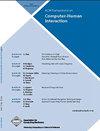框架机器学习机会低血压预测围手术期护理:社会技术的角度
IF 6.6
2区 计算机科学
Q1 COMPUTER SCIENCE, CYBERNETICS
引用次数: 0
摘要
围手术期低血压如果未被发现或控制,可导致严重的临床并发症。基于常规收集的EHR数据的预测性机器学习模型,为低血压的早期预警提供了可能,从而能够进行主动的临床干预。然而,虽然研究已经证明了这种机器学习模型的可行性,但在围手术期护理工作的社会技术背景下,他们的制定和发展却很少。为了解决这个问题,我们提出了临床团队在手术期间和手术后的协作工作实践的研究,特别强调低血压管理的组织。研究结果强调了预测性见解可以有效地用于重新配置护理和促进更主动的低血压管理。我们进一步探索社会技术见解如何帮助定义机器学习预测任务的关键参数,以配合协作临床实践的需求。我们讨论了医院护理中预测机器学习设计的更一般含义。本文章由计算机程序翻译,如有差异,请以英文原文为准。
Framing Machine Learning Opportunities for Hypotension Prediction in Perioperative Care: A Socio-Technical Perspective
Hypotension during perioperative care, if undetected or uncontrolled, can lead to serious clinical complications. Predictive machine learning models, based on routinely collected EHR data, offer potential for early warning of hypotension to enable proactive clinical intervention. However, while research has demonstrated the feasibility of such machine learning models, little effort is made to ground their formulation and development in socio-technical context of perioperative care work. To address this, we present a study of collaborative work practices of clinical teams during and after surgery with specific emphasis on the organisation of hypotension management. The findings highlight where predictive insights could be usefully deployed to reconfigure care and facilitate more proactive management of hypotension. We further explore how the socio-technical insights help define key parameters of machine learning prediction tasks to align with the demands of collaborative clinical practice. We discuss more general implications for the design of predictive machine learning in hospital care.
求助全文
通过发布文献求助,成功后即可免费获取论文全文。
去求助
来源期刊

ACM Transactions on Computer-Human Interaction
工程技术-计算机:控制论
CiteScore
8.50
自引率
5.40%
发文量
94
审稿时长
>12 weeks
期刊介绍:
This ACM Transaction seeks to be the premier archival journal in the multidisciplinary field of human-computer interaction. Since its first issue in March 1994, it has presented work of the highest scientific quality that contributes to the practice in the present and future. The primary emphasis is on results of broad application, but the journal considers original work focused on specific domains, on special requirements, on ethical issues -- the full range of design, development, and use of interactive systems.
 求助内容:
求助内容: 应助结果提醒方式:
应助结果提醒方式:


